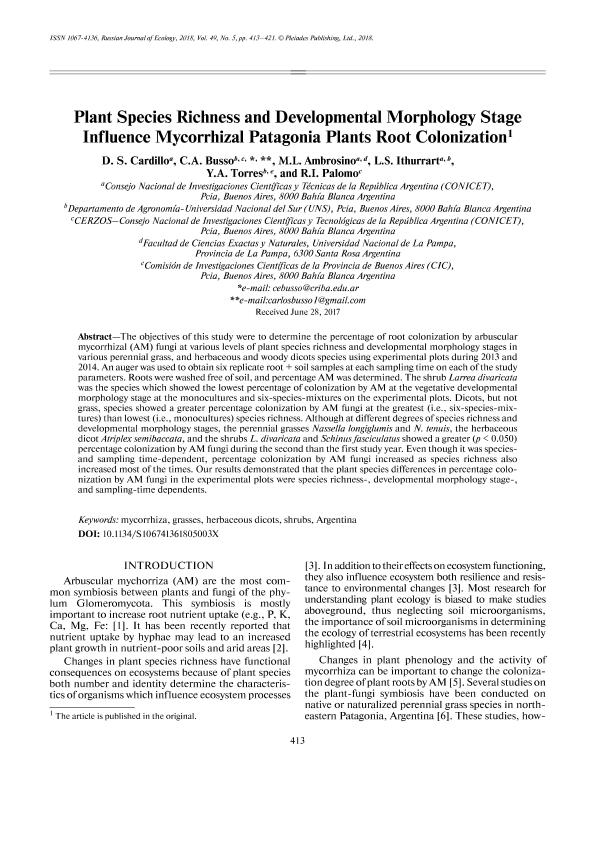Mostrar el registro sencillo del ítem
dc.contributor.author
Cardillo, Daniela Solange

dc.contributor.author
Busso, Carlos Alberto

dc.contributor.author
Ambrosino, Mariela Lis

dc.contributor.author
Ithurrart, Leticia Soledad

dc.contributor.author
Torres, Yanina Alejandra

dc.contributor.author
Palomo, Iris Rosana

dc.date.available
2019-10-29T15:33:30Z
dc.date.issued
2018-10-10
dc.identifier.citation
Cardillo, Daniela Solange; Busso, Carlos Alberto; Ambrosino, Mariela Lis; Ithurrart, Leticia Soledad; Torres, Yanina Alejandra; et al.; Plant Species Richness and Developmental Morphology Stage Influence Mycorrhizal Patagonia Plants Root Colonization; SP MAIK Nauka/Interperiodica; Russian Journal Of Ecology; 49; 5; 10-10-2018; 413-421
dc.identifier.issn
1067-4136
dc.identifier.uri
http://hdl.handle.net/11336/87529
dc.description.abstract
The objectives of this study were to determine the percentage of root colonization by arbuscularmycorrhizal (AM) fungi at various levels of plant species richness and developmental morphology stages in various perennial grass, and herbaceous and woody dicots species using experimental plots during 2013 and 2014. An auger was used to obtain six replicate root + soil samples at each sampling time on each of the study parameters. Roots were washed free of soil, and percentage AM was determined. The shrub Larrea divaricate was the species which showed the lowest percentage of colonization by AM at the vegetative developmental morphology stage at the monocultures and six-species-mixtures on the experimental plots. Dicots, but not grass, species showed a greater percentage colonization by AM fungi at the greatest (i.e., six-species-mixtures) than lowest (i.e., monocultures) species richness. Although at different degrees of species richness and developmental morphology stages, the perennial grasses Nassella longiglumis and N. tenuis, the herbaceous dicot Atriplex semibaccata, and the shrubs L. divaricata and Schinus fasciculatus showed a greater (p < 0.050) percentage colonization by AM fungi during the second than the first study year. Even though it was speciesand sampling time-dependent, percentage colonization by AM fungi increased as species richness also increased most of the times. Our results demonstrated that the plant species diff erences in percentage colonization by AM fungi in the experimental plots were species richness-, developmental morphology stage-, and sampling-time dependents.
dc.format
application/pdf
dc.language.iso
eng
dc.publisher
SP MAIK Nauka/Interperiodica

dc.rights
info:eu-repo/semantics/openAccess
dc.rights.uri
https://creativecommons.org/licenses/by-nc-sa/2.5/ar/
dc.subject
Mycorrhiza
dc.subject
Grasses
dc.subject
Herbaceous dicots
dc.subject
Shrubs
dc.subject
Argentina
dc.subject.classification
Agronomía, reproducción y protección de plantas

dc.subject.classification
Agricultura, Silvicultura y Pesca

dc.subject.classification
CIENCIAS AGRÍCOLAS

dc.title
Plant Species Richness and Developmental Morphology Stage Influence Mycorrhizal Patagonia Plants Root Colonization
dc.type
info:eu-repo/semantics/article
dc.type
info:ar-repo/semantics/artículo
dc.type
info:eu-repo/semantics/publishedVersion
dc.date.updated
2019-10-22T17:36:55Z
dc.identifier.eissn
1608-3334
dc.journal.volume
49
dc.journal.number
5
dc.journal.pagination
413-421
dc.journal.pais
Rusia

dc.description.fil
Fil: Cardillo, Daniela Solange. Consejo Nacional de Investigaciones Científicas y Técnicas. Centro Científico Tecnológico Conicet - Bahía Blanca; Argentina
dc.description.fil
Fil: Busso, Carlos Alberto. Universidad Nacional del Sur. Departamento de Agronomia. Laboratorio de Ecología; Argentina. Consejo Nacional de Investigaciones Científicas y Técnicas. Centro Científico Tecnológico Conicet - Bahía Blanca. Centro de Recursos Naturales Renovables de la Zona Semiárida. Universidad Nacional del Sur. Centro de Recursos Naturales Renovables de la Zona Semiárida; Argentina
dc.description.fil
Fil: Ambrosino, Mariela Lis. Consejo Nacional de Investigaciones Científicas y Técnicas. Centro Científico Tecnológico Conicet - Bahía Blanca; Argentina. Universidad Nacional de La Pampa; Argentina
dc.description.fil
Fil: Ithurrart, Leticia Soledad. Universidad Nacional del Sur. Departamento de Agronomia. Laboratorio de Ecología; Argentina. Consejo Nacional de Investigaciones Científicas y Técnicas. Centro Científico Tecnológico Conicet - Bahía Blanca; Argentina
dc.description.fil
Fil: Torres, Yanina Alejandra. Consejo Nacional de Investigaciones Científicas y Técnicas. Centro Científico Tecnológico Conicet - Bahía Blanca; Argentina. Universidad Nacional del Sur. Departamento de Agronomia. Laboratorio de Ecología; Argentina. Provincia de Buenos Aires. Gobernación. Comisión de Investigaciones Científicas; Argentina
dc.description.fil
Fil: Palomo, Iris Rosana. Consejo Nacional de Investigaciones Científicas y Técnicas. Centro Científico Tecnológico Conicet - Bahía Blanca. Centro de Recursos Naturales Renovables de la Zona Semiárida. Universidad Nacional del Sur. Centro de Recursos Naturales Renovables de la Zona Semiárida; Argentina
dc.journal.title
Russian Journal Of Ecology

dc.relation.alternativeid
info:eu-repo/semantics/altIdentifier/url/https://link.springer.com/article/10.1134/S106741361805003X
dc.relation.alternativeid
info:eu-repo/semantics/altIdentifier/doi/http://dx.doi.org/10.1134/S106741361805003X
Archivos asociados
